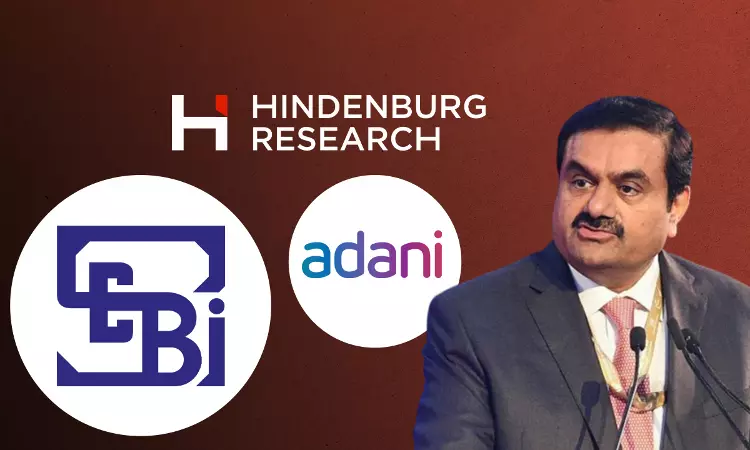Why Adani Group Is A Magnet For Controversy, Seven Of The Listed Adani Group Companies Got SEBI Notices In 2024; Again Hindenburg Allegations Ring True

Few names draw as much attention and controversy as the Adani Group. With a vast empire spanning multiple sectors, from energy to infrastructure, Adani has become synonymous with both ambition and scrutiny.
Yet, despite the massive growth and bagged projects both in India and abroad, the spotlight often finds them for all the wrong reasons.
The Adani name reached a crescendo when Hindenburg Research unleashed a torrent of allegations against Adani, accusing them of a litany of wrongdoings. While the group vehemently refuted these claims, the incident only served to illuminate the persistent cloud of suspicion that seems to hang over their operations.
The latest to spill out of the closet is the disclosure – seven out of the ten listed entities within the Adani Group revealed that they had received show cause notices from the Securities and Exchange Board of India (SEBI) during the previous fiscal year.
These notices cited violations of specific regulations, such as non-compliance with listing and related party transaction norms. However, the companies clarified that these notices had no significant impact on their financial statements.
Adani Enterprises, Adani Green Energy, Adani Power, Adani Energy Solutions, Adani Total Gas, and Adani Wilmar acknowledged receiving SEBI notices during the fourth quarter of FY2024 and reported these disclosures in separate filings to stock exchanges.
Adani Ports and Logistics also disclosed that they received a similar notice during FY24.
Adani Enterprises recently informed the exchanges that during the quarter ending on March 31, 2024, they received two show cause notices from SEBI.
These notices alleged non-compliance with provisions of the Listing Agreement and LODR Regulations concerning related party transactions with third parties, as well as the validity of peer review certificates issued by statutory auditors for earlier years.
However, the company’s management asserted that these notices had no material consequential effect on the relevant financial statements and that there was no material non-compliance with applicable laws and regulations.
None of the seven companies provided further details regarding the specific violations of SEBI norms mentioned in the show cause notices.
 What Were These Notices About?
What Were These Notices About?
Adani Green Energy disclosed receiving a notice from SEBI regarding the validity of a Peer Review Certificate (PRC) issued by one of its joint auditors for previous financial years.
According to the company it responded to this notice accordingly.
Following the storm stirred by Hindenburg’s report in January 2023, legal action swiftly ensued, with various writ petitions landed at the doorstep of the Supreme Court, urging an independent probe into the allegations levied in the report.
In March of the same year, the apex court took decisive action, forming an expert committee led by former judge Justice A M Sapre. This committee was tasked with investigating whether regulatory oversight faltered in addressing the purported breaches of securities market laws attributed to the Adani Group or its affiliated entities.
According to the status report issued by the Supreme Court, by August 25, 2023, the Securities and Exchange Board of India (SEBI) had concluded its investigations into twenty-two out of twenty-four cases under scrutiny.
 However, the legal trend continued into the new year.
However, the legal trend continued into the new year.
In January of the subsequent year, the Supreme Court brought closure to several petitions, including those clamoring for autonomous investigations into the claims delineated in the Hindenburg Report.
The court directed SEBI to wrap up the remaining two pending investigations within three months, emphasizing the imperative to bring all ongoing inquiries, including the twenty-two already completed, to their logical resolutions.
The Deep Dive
But let us look a bit deeper beyond the Hindenburg controversy.
Adani’s ventures frequently find themselves under the microscope due to a variety of issues, ranging from environmental concerns to corporate governance.
1. Environmental Impact—Adani’s forays into energy, particularly coal mining, have sparked fierce debates about its environmental footprint. Critics argue that its projects pose significant risks to delicate ecosystems and exacerbate climate change.
Adani’s environmental track record is a source of constant contention, from the controversy surrounding the Carmichael coal mine in Australia to protests against port expansions in India.
2. Land Acquisition—The group’s ambitious infrastructure projects often entail large-scale land acquisitions, leading to allegations of land grabbing and displacement of indigenous communities.
These accusations have not only tarnished Adani’s reputation but also spotlight broader issues of corporate accountability and social justice.
3. Regulatory Scrutiny—Adani’s rapid expansion has raised eyebrows among watchers, who scrutinize their complex corporate structures and dealings. Questions about transparency, related-party transactions, and regulatory compliance have dogged the conglomerate, fueling suspicions of impropriety.
4. Financial Health—Despite their formidable stature, Adani’s financial health has come under scrutiny on multiple occasions.
From concerns about debt levels to questions about the sustainability of their growth trajectory, investors and analysts remain vigilant about potential risks lurking beneath the surface.
5. Political Entanglements—Adani’s close ties with political elites, aka BJP, have invited accusations of crony capitalism and undue influence.
While such relationships may grease the wheels of business, they also raise concerns about fair competition and the integrity of the regulatory environment.
 More Digging
More Digging
The Adani Group emerges as a nexus of suspicion, veiled in ambiguity despite its towering stature in the business world and at the heart of this scepticism lies a convergence of factors that paint a picture of opaqueness and uncertainty.
First and foremost, the sheer scale of the group’s operations is staggering. With a plethora of ambitious projects spanning India and abroad, Adani’s reach extends across multiple sectors, from energy and infrastructure to ports and logistics.
Yet, amidst this grandiose vision, questions come forth about the transparency and accountability of the massive empire.
One of the most glaring concerns is the group’s massive debt burden.
Despite its formidable presence, Adani’s financial health appears precarious, weighed down by colossal loans that raise red flags among investors and analysts alike.
The opacity surrounding the group’s debt levels only serves to deepen suspicions about its long-term sustainability and resilience in the face of economic headwinds.
Furthermore, Adani’s labyrinthine corporate structure adds another layer of complexity to the equation. With so many subsidiaries and affiliated entities, deciphering the true extent of the group’s operations becomes a Herculean task.
Therefore, this lack of clarity not only facilitates an environment ripe for speculation but also raises doubts about the integrity of its governance framework.
Moreover, the group’s penchant for controversial projects fuels doubt about its ethical compass – from contentious coal mining ventures to port expansions embroiled in environmental controversies, to the dharavi rebuilding project; Adani’s track record is rife with instances that invite scrutiny and condemnation.
Such ventures not only emphasise the group’s willingness to prioritize profit over sustainability but also reinforce perceptions of it operating on the fringes of regulatory compliance.
 Treading International Waters
Treading International Waters
The Adani Group has also faced its fair share of troubles and scrutiny abroad, often stemming from its international ventures and business dealings. Here are a few notable instances –
1. Carmichael Coal Mine Project in Australia- One of the most high-profile controversies involving the Adani Group is its Carmichael coal mine project in Queensland, Australia.
The project has been mired in years of legal battles, environmental protests, and regulatory hurdles.
Critics have raised concerns about the potential environmental impact of the mine on the Great Barrier Reef, groundwater resources, and local ecosystems.
Additionally, there have been allegations of Adani exaggerating the economic benefits of the project, leading to scrutiny from Australian authorities and civil society groups.
2. Port Expansions in Australia – Apart from the Carmichael coal mine, Adani’s port expansions in Australia have also attracted scrutiny and opposition.
The company’s plans to expand the Abbot Point coal terminal faced legal challenges and protests due to concerns about the dredging of the Great Barrier Reef Marine Park and the impact on marine life.
3. Financial Irregularities in Singapore – In 2016, the Adani Group’s operations in Singapore came under scrutiny when it was reported that three of its subsidiaries were being investigated by the Monetary Authority of Singapore (MAS) for alleged financial irregularities.
The subsidiaries were accused of improper accounting practices and misleading disclosures in their financial statements. This incident raised questions about the group’s corporate governance standards and financial transparency.
4. Coal Imports Controversy in India –While not abroad, Adani’s coal import business in India has also faced scrutiny and controversy.
In 2018, there were allegations that the Adani Group had inflated the cost of coal imports, resulting in higher electricity tariffs for consumers.
The Central Electricity Regulatory Commission (CERC) initiated an investigation into the matter, probing whether Adani had overcharged for electricity due to inflated coal import costs.
The Last Bit, These instances highlight the diverse array of challenges and controversies that the Adani Group has encountered beyond its home turf in India.
Whether it’s environmental concerns, financial irregularities, or regulatory scrutiny, the group’s international operations have often been a focal point of controversy and criticism.
The Adani Group’s mysterious dealings stem from a combination of factors: towering debt, opaque corporate structures, and a penchant for contentious projects.
While it may wield considerable influence and command attention on the global stage, the cloud of suspicion that shrouds its operations indicates what may be lurking beneath the surface of corporate behemoths.
In the volatile arena of business, controversy is often an unwelcome companion. Yet, for Adani, it seems to be a constant companion, overshadowing their achievements and casting doubt on their intentions.
As choppy waters of public scrutiny gain more ground, the Adani Group faces an uphill battle to restore trust and prove that they are not just newsmakers but agents of positive change.




